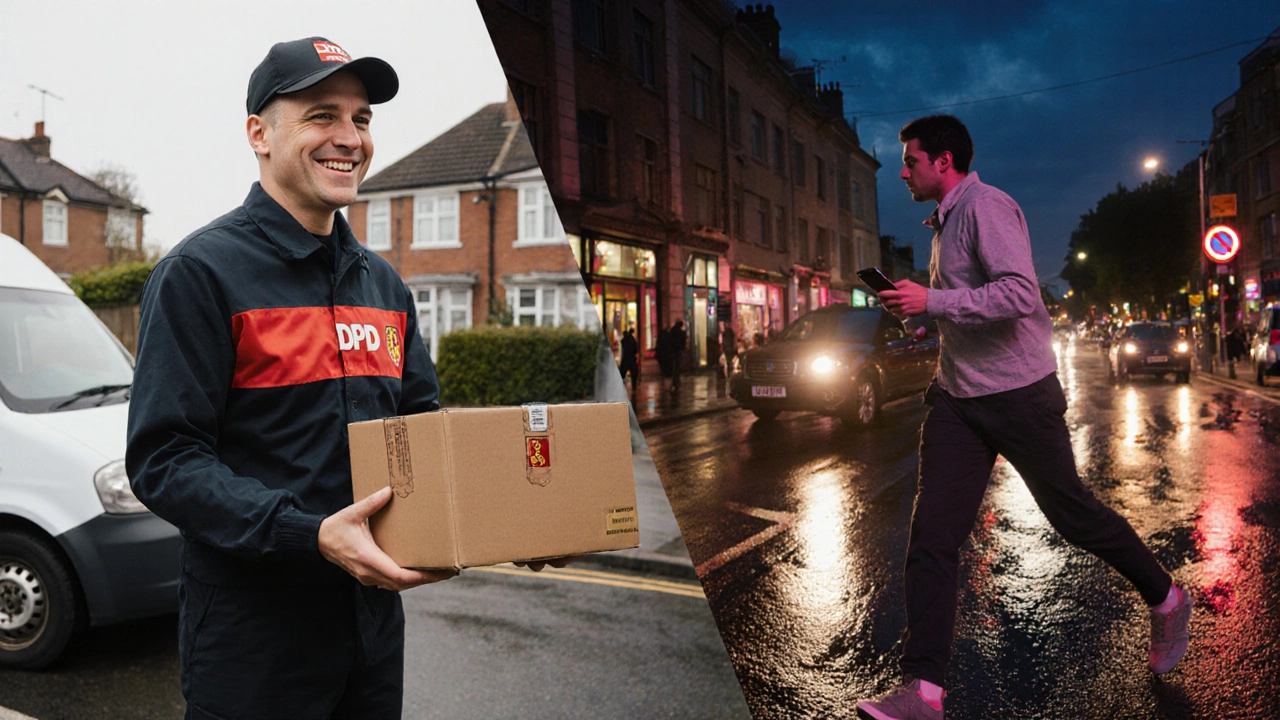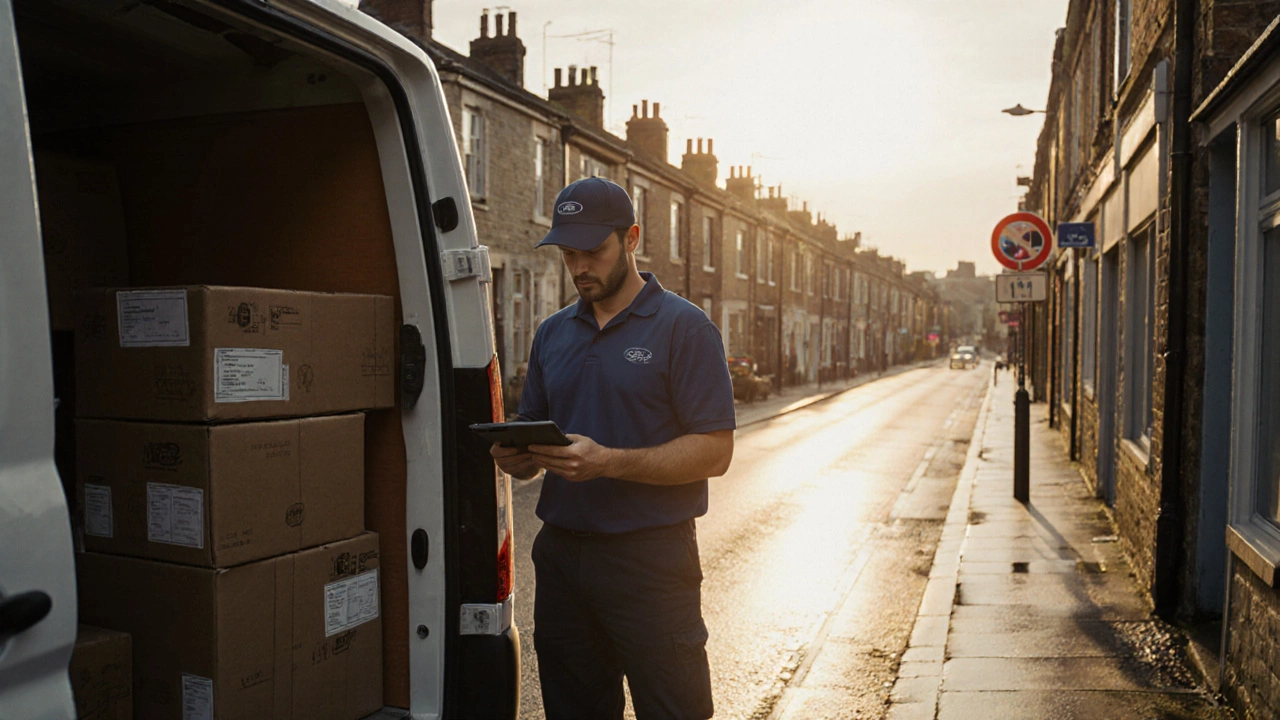Local Courier Earnings Calculator
Estimate Your Courier Earnings
If you're thinking about becoming a local courier in the UK, you're not alone. More people are turning to delivery work after losing jobs in retail or hospitality, or just wanting flexible hours. But the big question everyone asks is: how much does a local courier make? The answer isn’t simple. It depends on where you are, who you work for, how many hours you put in, and whether you're self-employed or employed by a company.
What do local couriers actually earn?
In 2025, the average local courier in the UK earns between £12 and £18 per hour before tax. That’s the range you’ll see if you look at job ads on Indeed, Reed, or Gumtree. But that’s not the full picture. Some drivers working for big names like DPD, Hermes, or Royal Mail make closer to £13-£15 an hour as employees. Others who work as self-employed couriers for platforms like Uber Connect, Deliveroo, or Amazon Flex can make £16-£22 an hour - but only if they’re efficient, know the routes, and avoid downtime.
Here’s the catch: hourly rates don’t tell the whole story. If you’re self-employed, you’re responsible for your own van insurance, fuel, maintenance, and MOT. That can eat up 25-40% of your gross income. A driver making £18/hour might only take home £10-£12 after expenses. Employees get paid holiday, sick pay, and sometimes a van - but they also have less control over their schedule.
Regional differences matter
Where you work makes a huge difference. In London, couriers can earn up to £20/hour because of higher demand and cost of living. But they also face congestion charges, ULEZ fees, and parking nightmares. A driver in Bristol, where I live, might make £14-£17/hour. In Manchester or Birmingham, it’s around £13-£16. Outside major cities - say, in rural Wales or the North East - pay drops to £11-£14 because there are fewer deliveries per shift and longer travel times between stops.
Some companies pay by the delivery, not the hour. In those cases, you might get £2-£4 per parcel. That sounds fine until you realize you’re doing 50 deliveries in 8 hours. That’s £100-£200 for a full day - but only if every drop goes smoothly. One missed address, one damaged package, or one traffic jam can cut your earnings fast.
Self-employed vs employed: which pays more?
Let’s break it down with real numbers from two drivers in the West Country.
Emma, employed courier (DPD, Bristol):
- Hourly rate: £14.50
- 40 hours/week
- Gross weekly pay: £580
- Holiday pay included
- Van, fuel, insurance covered
- Net weekly take-home: £470 after tax
James, self-employed (Amazon Flex, Bath):
- Average £18/hour
- Works 45 hours/week
- Gross weekly: £810
- Van payment: £180/month (£45/week)
- Fuel: £120/week
- Insurance: £35/week
- Maintenance: £20/week
- Total expenses: £220/week
- Net weekly take-home: £590
James makes more - but only because he works longer hours and drives a newer van that’s more fuel-efficient. He also doesn’t get paid for time waiting for packages or dealing with customer complaints. Emma has less control, but her pay is stable. She doesn’t have to worry about her van breaking down on a Friday night.

How to make more as a local courier
If you want to earn more than the average, here’s what actually works:
- Work for multiple platforms - Combine Amazon Flex, DPD Local, and a local pharmacy delivery contract. You’ll fill gaps in your schedule.
- Use route-planning apps - Tools like Route4Me or Google Maps with waypoints can save you 15-20% on fuel and time.
- Get a fuel-efficient van - A diesel Ford Transit Custom or Volkswagen Transporter with low mileage can cut fuel costs by £30-£50 a week.
- Work weekends and evenings - Many companies pay 1.5x or 2x for weekend shifts. A 10-hour Saturday shift can net you £180-£250.
- Avoid penalties - Late drops, missed scans, or damaged goods can cost you £10-£50 per incident. Double-check addresses and use delivery confirmation apps.
One driver in Cardiff told me he added a weekly grocery delivery route for a local supermarket. It added £120 a week to his income with zero extra fuel cost - he was already driving through that area. Small tweaks like that make the difference between scraping by and saving money.
What’s the real take-home after expenses?
Let’s say you drive 15,000 miles a year - that’s average for a full-time courier. Your van costs £10,000 and lasts 5 years. That’s £2,000 a year in depreciation. Fuel? £2,500. Insurance? £1,200. Maintenance? £800. MOT? £60. Tax and National Insurance? £1,800 (if self-employed). That’s £8,360 in annual costs.
If you earn £20,000 gross, you’re left with £11,640 after expenses - about £224 a week. That’s below the UK living wage for a single adult. But if you earn £28,000 gross? You’re at £19,640 net - that’s £378 a week. That’s doable, especially if you live with family or have low rent.
Most couriers don’t make £30,000+ unless they’re working 55+ hours a week, have a side hustle, or own their own business and hire drivers. The top earners aren’t just drivers - they’re small business owners.

Who’s hiring and what’s the demand like?
The demand for local couriers is still growing. In 2025, 62% of UK consumers expect same-day delivery for online orders, up from 41% in 2022. That means companies are hiring faster than ever - but turnover is high too. One logistics firm in Reading told me they hire 80 new drivers a month - and lose 70 of them by the end of the quarter. Why? Burnout, low pay after expenses, and poor scheduling.
Big players like DHL, FedEx, and Yodel are offering signing bonuses of up to £500 for new drivers with a clean license and their own van. Smaller firms like CitySprint and Parcel2Go are offering higher hourly rates to compete. If you’re just starting, now’s the time to negotiate. Ask for fuel allowances, paid training, or a guaranteed minimum number of hours per week.
Is it worth it?
Is being a local courier worth it? It depends on what you need.
If you want flexibility, control over your time, and don’t mind physical work - yes. You can work around school runs, medical appointments, or other jobs. You’re outside, moving, and not stuck at a desk. But if you’re looking for a steady paycheck with benefits, you’re better off applying for a job with a company that provides a van and pays holiday pay.
Don’t believe the social media posts that say “Make £1,000 a week delivering parcels!” That’s rare. It usually means working 7 days a week, driving 800 miles, and skipping meals. Realistic earnings? £300-£450 a week after expenses, if you’re smart and consistent.
Many couriers I’ve spoken to say the best part isn’t the money - it’s the independence. You’re your own boss. No micromanaging. No office politics. Just you, your van, and the road. But that freedom comes with responsibility. And if you don’t plan for expenses, you’ll be surprised at how fast your earnings vanish.
How much does a local courier make per day in the UK?
On average, a local courier in the UK makes between £100 and £180 per day after expenses, assuming an 8-10 hour shift. Self-employed drivers who work efficiently and take weekend shifts can earn £200-£250 on busy days. Those employed by companies typically earn £100-£140 per day after tax, with benefits included.
Do couriers get paid for waiting time?
Most courier companies don’t pay for waiting time. If you’re stuck at a business that’s closed, or a customer isn’t home, that time usually doesn’t count. Some platforms like Amazon Flex pay a small fee (£1-£2) if you wait over 10 minutes, but it’s not guaranteed. Self-employed drivers have to factor in waiting time as part of their cost of doing business.
Can you make a living as a local courier?
Yes, but it’s not easy. To make a decent living, you need to earn at least £25,000-£30,000 gross per year before expenses. That means working 45-50 hours a week consistently. Many couriers supplement their income with part-time jobs, or use delivery work as a side hustle while studying or caring for family. It’s possible, but only if you’re disciplined, plan your expenses, and avoid burnout.
Do couriers get paid weekly or monthly?
Most employed couriers get paid monthly, like other employees. Self-employed couriers working for platforms like Uber or Amazon Flex usually get paid weekly - often every Tuesday or Wednesday. Some smaller local firms pay weekly or even daily. Always check the payment schedule before signing up.
What van do I need to be a courier?
You don’t need a fancy van. Most couriers use a small to medium-sized van like a Ford Transit Custom, Volkswagen Transporter, or Renault Trafic. The key is reliability, good fuel economy, and enough space for 20-50 parcels. A van under 5 years old with under 80,000 miles is ideal. Some companies provide vans, but most expect you to supply your own.
Are there any hidden costs I should know about?
Yes. Beyond fuel and insurance, watch out for congestion charges (like London’s ULEZ), parking fines, tolls, and wear-and-tear on your tyres and brakes. You’ll also need a valid commercial van insurance policy - standard car insurance won’t cover you. Some platforms charge you for using their app or take a percentage of each delivery. Always read the fine print.
Can I work as a courier if I have a criminal record?
It depends on the record and the company. Most large couriers run DBS checks. Minor, old offences (like a traffic ticket or a fine from 10 years ago) usually won’t stop you. Serious offences - especially theft, violence, or drug-related - will. Smaller local firms are often more flexible. If you’re honest about your record, you might still get hired, especially if you can prove you’ve turned things around.
Next steps if you want to start
If you’re serious about becoming a local courier, here’s what to do next:
- Check your driving licence - you need a full UK driving licence (category B). Some jobs require a C1 if you’re driving larger vans.
- Get commercial van insurance - don’t skip this. It’s not optional.
- Research local companies - look at job boards, local Facebook groups, and company websites. Don’t just apply to the biggest names.
- Calculate your costs - use a spreadsheet to track fuel, insurance, and maintenance. Know your break-even point.
- Start small - try one platform for a week. See how the pay, scheduling, and workload really feel.
There’s no magic formula to get rich as a courier. But if you treat it like a business - not just a job - you can make a solid, sustainable income. Just don’t believe the hype. The real money goes to those who plan ahead, track every expense, and keep their van running.





